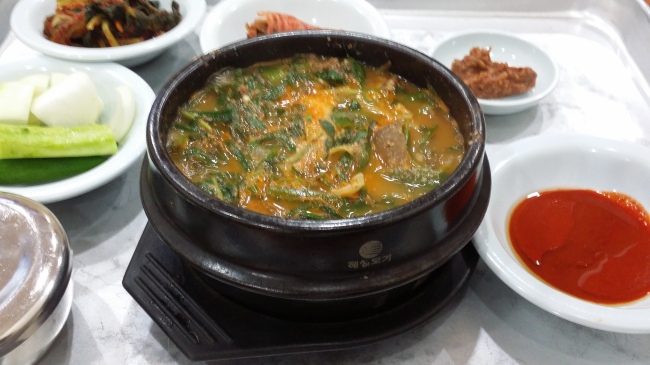It had not occurred to Choi Jin-kyu, 30, until he was older that eating bosintang, or a hot soup made of dog meat, might be a habit that was frowned upon.
His father has been taking him to eat the soup, long perceived here as energy-boosting and good for one’s health, since he was 10. He continues to enjoy it especially during the sizzling summer heat.
“My father used to take me to this place. He said it would strengthen immunity and fend off viruses. Now that MERS is in town, I should eat it more often,” he said, referring to the recent outbreak of Middle East respiratory syndrome while waiting in line at a restaurant in Gangnam-gu, southern Seoul.
Although derived from centuries-old customs ― Koreans are said to have eaten dog meat since the 14th century, with influence from the Yuan Dynasty ― dog eating has never been formally regulated here in Korea. Debate persists over whether recognizing dog as food would protect the eaters or the dogs.
Advocates assert that the legalization is the best way to ensure its safety as it is an undeniable fact that there is a large population that eats dog meat. It would also enable divided control and management of dogs raised as pets and those raised as livestock, they say.
 |
| Bosintang, Korean dog meat soup (Yeo Jun-suk/The Korea Herald) |
Opponents contend that recognizing dogs as being edible would put a death sentence on the worldwide fight against the brutal custom in this country.
“Eating dog is part of Korea’s culinary tradition, not a hush-hush delicacy,” said Choi Young-in, the secretary-general of South Korea’s Dog Meat Farmers Association. “If you look at traditional Korean medicine books, such as Dongui Bogam, you will find out that dog was used to improve the body’s metabolic system,” said Choi.
He urged lawmakers to change relevant laws for dog meat, claiming that the law had failed to reflect the fact millions of Koreans eat dog. He believes the law should address the public concerns over the meat by bringing the meat’s supply under legal scrutiny.
According to relevant laws, dog meat is outside of the public health regulations for meat. As dogs are not classified as livestock, unlike cows, pigs, lambs and 11 other animals, the government has no authority to enforce sanitation rules on dog meat.
But opponents assert that the legalization would bring more harm to the table and the nation. They argue that the legalization would pave the way for mass production that might expose dogs to the danger of infectious diseases.
“Dogs are not suitable to be meat,” said Park So-youn, the chief of Coexistence of Animal Rights on Earth, a Seoul-based animal rights group. “Unlike other animals, dogs tend to fight one another in cramped cages. Dogs may also suffer from infection and spread diseases like the bird flu,” said Park.
She pointed out that Korea would be the first country to legalize dog meat ― a stigma that the government had avoided since the 1988 Seoul Olympics. It took dogs off the list of livestock available for meat to fend off international condemnation.
The government said it is not planning to change the law.
“The law has been in place for decades. Now it is too difficult to change. We should leave the issue up to consumers,” said an official from the Ministry of Agriculture, Food and Rural Affairs, who refused to be identified.
By Yeo Jun-suk (jasonyeo@heraldcorp.com)

